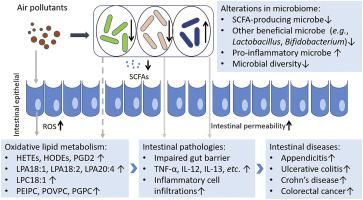当前位置:
X-MOL 学术
›
Free Radical Bio. Med.
›
论文详情
Our official English website, www.x-mol.net, welcomes your
feedback! (Note: you will need to create a separate account there.)
Impact of air pollution on intestinal redox lipidome and microbiome.
Free Radical Biology and Medicine ( IF 7.1 ) Pub Date : 2020-01-02 , DOI: 10.1016/j.freeradbiomed.2019.12.044 Juan Feng 1 , Susana Cavallero 2 , Tzung Hsiai 3 , Rongsong Li 1
Free Radical Biology and Medicine ( IF 7.1 ) Pub Date : 2020-01-02 , DOI: 10.1016/j.freeradbiomed.2019.12.044 Juan Feng 1 , Susana Cavallero 2 , Tzung Hsiai 3 , Rongsong Li 1
Affiliation

|
Air pollution is a rising public health issue worldwide. Cumulative epidemiological and experimental studies have shown that exposure to air pollution such as particulate matter (PM) is linked with increased hospital admissions and all-cause mortality. While previous studies on air pollution mostly focused on the respiratory and cardiovascular effects, emerging evidence supports a significant impact of air pollution on the gastrointestinal (GI) system. The gut is exposed to PM as most of the inhaled particles are removed from the lungs to the GI tract via mucociliary clearance. Ingestion of contaminated food and water is another common source of GI tract exposure to pollutants. Recent studies have associated air pollution with intestinal diseases, including appendicitis, colorectal cancer, and inflammatory bowel disease. In addition to the liver and adipose tissue, intestine is an important organ system for lipid metabolism, and the intestinal redox lipids might be tightly associated with the intestinal and systematic inflammation. The gut microbiota modulates lipid metabolism and contributes to the initiation and development of intestinal disease including inflammatory bowel disease. Recent data support microbiome implication in air pollution-mediated intestinal and systematic effects. In this review, the associations between air pollution and intestinal diseases, and the alterations of intestinal lipidome and gut microbiome by air pollution are highlighted. The potential mechanistic aspects underlying air pollution-mediated intestinal pathology will also be discussed.
中文翻译:

空气污染对肠道氧化还原脂质组和微生物组的影响。
空气污染是全球范围内日益严重的公共健康问题。累积的流行病学和实验研究表明,暴露于空气污染(例如颗粒物(PM))与住院人数增加和全因死亡率相关。尽管先前有关空气污染的研究主要集中在呼吸和心血管方面,但新出现的证据支持空气污染对胃肠道(GI)系统的重大影响。由于大多数吸入颗粒通过粘膜纤毛清除从肺部转移到胃肠道,因此肠道暴露于PM。摄入污染的食物和水是胃肠道接触污染物的另一种常见来源。最近的研究已将空气污染与肠道疾病相关联,包括阑尾炎,大肠癌和炎症性肠病。除肝脏和脂肪组织外,肠道也是脂质代谢的重要器官系统,肠道氧化还原脂质可能与肠道和系统性炎症密切相关。肠道菌群调节脂质代谢,并促进包括炎症性肠病在内的肠道疾病的发生和发展。最近的数据支持微生物组在空气污染介导的肠道和系统作用中的意义。在这篇综述中,强调了空气污染与肠道疾病之间的联系,以及空气污染对肠道脂质组和肠道微生物组的影响。还将讨论空气污染介导的肠道病理的潜在机制。肠道氧化还原脂质可能与肠道和系统性炎症密切相关。肠道菌群调节脂质代谢,并促进包括炎症性肠病在内的肠道疾病的发生和发展。最近的数据支持微生物组在空气污染介导的肠道和系统作用中的意义。在这篇综述中,强调了空气污染与肠道疾病之间的联系,以及空气污染对肠道脂质组和肠道微生物组的影响。还将讨论空气污染介导的肠道病理的潜在机制。肠道氧化还原脂质可能与肠道和系统性炎症密切相关。肠道菌群调节脂质代谢,并促进包括炎症性肠病在内的肠道疾病的发生和发展。最近的数据支持微生物组在空气污染介导的肠道和系统作用中的意义。在这篇综述中,强调了空气污染与肠道疾病之间的联系,以及空气污染对肠道脂质组和肠道微生物组的影响。还将讨论空气污染介导的肠道病理的潜在机制。肠道菌群调节脂质代谢,并促进包括炎症性肠病在内的肠道疾病的发生和发展。最近的数据支持微生物组在空气污染介导的肠道和系统作用中的意义。在这篇综述中,强调了空气污染与肠道疾病之间的联系,以及空气污染对肠道脂质组和肠道微生物组的影响。还将讨论空气污染介导的肠道病理的潜在机制。肠道菌群调节脂质代谢,并促进包括炎症性肠病在内的肠道疾病的发生和发展。最近的数据支持微生物组在空气污染介导的肠道和系统作用中的意义。在这篇综述中,强调了空气污染与肠道疾病之间的联系,以及空气污染对肠道脂质组和肠道微生物组的影响。还将讨论空气污染介导的肠道病理的潜在机制。并突出了空气污染对肠道脂质组和肠道微生物组的影响。还将讨论空气污染介导的肠道病理的潜在机制。并突出了空气污染对肠道脂质组和肠道微生物组的影响。还将讨论空气污染介导的肠道病理的潜在机制。
更新日期:2020-01-02
中文翻译:

空气污染对肠道氧化还原脂质组和微生物组的影响。
空气污染是全球范围内日益严重的公共健康问题。累积的流行病学和实验研究表明,暴露于空气污染(例如颗粒物(PM))与住院人数增加和全因死亡率相关。尽管先前有关空气污染的研究主要集中在呼吸和心血管方面,但新出现的证据支持空气污染对胃肠道(GI)系统的重大影响。由于大多数吸入颗粒通过粘膜纤毛清除从肺部转移到胃肠道,因此肠道暴露于PM。摄入污染的食物和水是胃肠道接触污染物的另一种常见来源。最近的研究已将空气污染与肠道疾病相关联,包括阑尾炎,大肠癌和炎症性肠病。除肝脏和脂肪组织外,肠道也是脂质代谢的重要器官系统,肠道氧化还原脂质可能与肠道和系统性炎症密切相关。肠道菌群调节脂质代谢,并促进包括炎症性肠病在内的肠道疾病的发生和发展。最近的数据支持微生物组在空气污染介导的肠道和系统作用中的意义。在这篇综述中,强调了空气污染与肠道疾病之间的联系,以及空气污染对肠道脂质组和肠道微生物组的影响。还将讨论空气污染介导的肠道病理的潜在机制。肠道氧化还原脂质可能与肠道和系统性炎症密切相关。肠道菌群调节脂质代谢,并促进包括炎症性肠病在内的肠道疾病的发生和发展。最近的数据支持微生物组在空气污染介导的肠道和系统作用中的意义。在这篇综述中,强调了空气污染与肠道疾病之间的联系,以及空气污染对肠道脂质组和肠道微生物组的影响。还将讨论空气污染介导的肠道病理的潜在机制。肠道氧化还原脂质可能与肠道和系统性炎症密切相关。肠道菌群调节脂质代谢,并促进包括炎症性肠病在内的肠道疾病的发生和发展。最近的数据支持微生物组在空气污染介导的肠道和系统作用中的意义。在这篇综述中,强调了空气污染与肠道疾病之间的联系,以及空气污染对肠道脂质组和肠道微生物组的影响。还将讨论空气污染介导的肠道病理的潜在机制。肠道菌群调节脂质代谢,并促进包括炎症性肠病在内的肠道疾病的发生和发展。最近的数据支持微生物组在空气污染介导的肠道和系统作用中的意义。在这篇综述中,强调了空气污染与肠道疾病之间的联系,以及空气污染对肠道脂质组和肠道微生物组的影响。还将讨论空气污染介导的肠道病理的潜在机制。肠道菌群调节脂质代谢,并促进包括炎症性肠病在内的肠道疾病的发生和发展。最近的数据支持微生物组在空气污染介导的肠道和系统作用中的意义。在这篇综述中,强调了空气污染与肠道疾病之间的联系,以及空气污染对肠道脂质组和肠道微生物组的影响。还将讨论空气污染介导的肠道病理的潜在机制。并突出了空气污染对肠道脂质组和肠道微生物组的影响。还将讨论空气污染介导的肠道病理的潜在机制。并突出了空气污染对肠道脂质组和肠道微生物组的影响。还将讨论空气污染介导的肠道病理的潜在机制。











































 京公网安备 11010802027423号
京公网安备 11010802027423号